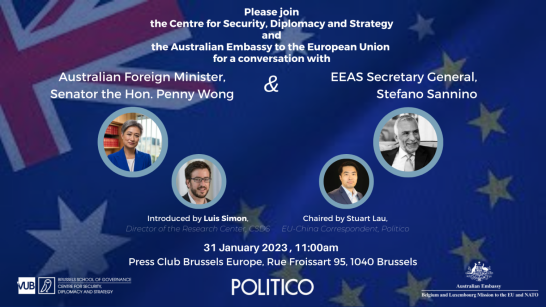Practical information

International politics have taken a competitive turn in recent years. The international rules-based order is being increasingly challenged, as illustrated most starkly by Russia’s invasion of Ukraine and China’s growing assertiveness in the Indo-Pacific and beyond. Greater strategic competition in Europe and the Indo-Pacific is reviving debates about the United States’ strategic priorities and tradeoffs. At the same time, intensifying great power competition across different domains such as security, technology, energy and markets is raising questions about the future of the international rules-based order. In this contested strategic environment, how can countries in Europe and the Indo-Pacific build a sustainable and cooperative security order?
You can register here.
PROGRAMME
10.45 – 11.00: Welcome and Registration
11.00 – 11.45: Public Event – “A conversation with Australian Foreign Minister Penny Wong and EEAS Secretary General Stefano Sannino”
- Introduced by Luis Simón, Director, Centre for Security, Diplomacy and Strategy (CSDS)
- Chaired by Stuart Lau, EU-China Correspondent, POLITICO Europe
Speakers
- Penny Wong, Minister for Foreign Affairs, Australia
- Stefano Sannino, Secretary General, EEAS
11.45 – 12.00: Q&A with audience
12.00 – 12.30: Light reception
PANEL PARTICIPANTS
- Stuart Lau
Stuart Lau is the EU-China Correspondent at POLITICO Europe, focusing on geopolitics, trade, tech, and foreign policies. Based in Brussels, Stuart is the author of POLITICO’s China Direct, a weekly newsletter on EU’s relations with the Asian superpower. Prior to this, he worked at BBC World Service and South China Morning Post.
- Stefano Sannino
Stefano Sannino is the Secretary-General of the European External Action Service (EEAS) of the European Union since 1 January 2021. He held the post of the Deputy Secretary General for Economic and Global Issues at the EEAS from April 2020 to December 2020. From March 2016 to April 2020, he was Ambassador of Italy to Spain and Andorra. From July 2013 until March 2016, he held the position of Permanent Representative of Italy to the EU in Brussels.
After a period at the Cabinet of the President of the Commission (from 2002 to 2004) he joined the Directorate General for External Relations as Director for Crisis Management and Representative at PSC (2004-2006), then Director for Latin America (2008-2009) and finally as Deputy Director General for Asia and Latin America (2009-2010).
In 2010 he moved to the Directorate General for Enlargement as Deputy Director General and later as Director General, a position he held until June 2013. From 2006 to 2008 he was the Diplomatic Advisor to the Italian Prime Minister and his Personal Representative to G8 summits. He has also held the position of Ambassador and Head of the OSCE Mission in Belgrade from 2001 to 2002 and within the Italian Diplomatic Service: Deputy Head of Mission of the Italian Embassy in Belgrade (1994-1996), Head of the Secretariat of the Under-Secretary of State for Foreign Affairs (1996-1998), Diplomatic Advisor and Head of the Cabinet of the Minister of Foreign Trade (1998-2001). Mr. Sannino is fluent in Spanish, English and French beyond his native Italian.
- Luis Simón
Luis Simón is Director of the Research Centre for Security, Diplomacy and Strategy (CSDS) and a Research Professor in International Security at the Brussels School of Governance (BSoG-VUB). He is also the Director of the Brussels office of the Elcano Royal Institute. Luis is a frequent lecturer on geopolitical and strategic affairs at several universities and defence colleges. His research has appeared in prestigious journals, such as Security Studies, International Affairs, The Journal of Strategic Studies, Geopolitics, Survival, Orbis or The RUSI Journal. He is also an Associate Fellow at the Royal United Services Institute (RUSI) and the Baltic Defence College, and a member of the editorial board of Parameters: The US Army War College Quarterly. Earlier, he was a postdoctoral FWO Fellow at the School of International and Public Affairs (Columbia University) and a visiting fellow at the School of Advanced International Studies (Johns Hopkins University). Luis holds a PhD in International Relations from the University of London, and a Master's degree from the Institute d’Etudes Politiques de Paris (Sciences Po).
- Penny Wong
As Minister for Foreign Affairs, Senator Wong seeks to rebuild Australia’s reputation as partner of choice to build a stable and prosperous region, where sovereignty is respected and the rules of the road are upheld.
From 2007 – 2010, she served as Minister for Climate Change and Water. In this position she significantly expanded the Renewable Energy Target, which has driven significant investment in wind and solar power. She also represented Australia in international climate change negotiations and developed the Rudd Government’s emissions trading scheme, a market based mechanism to reduce Australia’s greenhouse gas emissions in the most economically efficient way. In 2013 Senator Wong was elected Leader of the Government in the Senate and, after the change of government in 2013, became Leader of the Opposition in the Senate – the first woman to hold either of these roles. She served as Shadow Foreign Minister for six years before the election of the Albanese Government in 2022.
Senator Wong was born in the Malaysian state of Sabah. Her family moved to Australia in 1976, when she was eight years old, and settled in Adelaide.